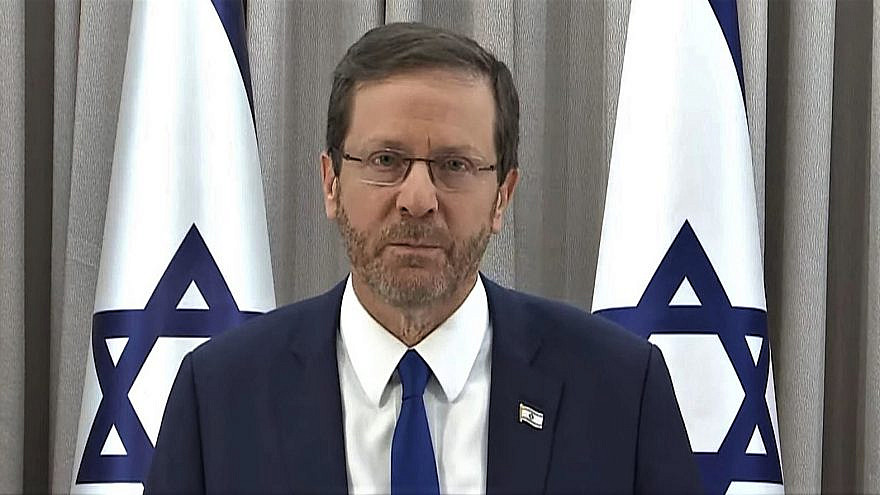Israeli President Isaac Herzog presented what he termed the “people’s plan,” referring to a compromise judicial-reform proposal that he developed, in a national address on Wednesday night.
He began his speech by painting a bleak picture of Israel’s political situation, in which protests have roiled the country over the government’s current plan, saying that he had spoken to thousands of citizens and never before heard such “frightening rhetoric.”
“I’m going to use a phrase I haven’t used before—an expression that no Israeli isn’t horrified by when he hears it. Anyone who thinks that a real civil war involving human life is a line we will not reach has no clue. Right now, in the 75th year of the State of Israel, the abyss is within reach,” he said.
Herzog emphasized that “civil war is a red line. I will not let it happen, at any cost, by any means.”
To succeed, the plan needs to “reflect a wide range of identities, beliefs and worldviews from all shades of the Israeli mosaic,” said Herzog, reiterating that he had spoken with citizens from all walks of life in producing his own plan. “I did not overlook any group. Everyone was given a place not only to have a voice but also to have a real impact. One of the things I learned, and not surprisingly, is how big the scope for agreement is.”
“The outline that I present today is a golden path, which brings together in a proper, decent, balanced and constructive manner the perceptions, beliefs, worries and concerns. It reflects the range of agreements and the greatest common denominator,” he said.
“It’s not the president’s plan. It’s the people’s plan,” Herzog declared.
‘Lower the flames’
Posted online in Hebrew, it strengthens the justice system, the government and the State of Israel, said the president.
Israeli Prime Minister Benjamin Netanyahu, who was scheduled to depart for Berlin at 5 p.m., delayed his flight to 10 p.m. in order to discuss the president’s proposal with relevant members of the coalition in the Knesset.
Those attending the discussions included Simcha Rothman, chairman of the Constitution, Law and Justice Committee; Aryeh Deri, chairman of the Shas Party; Minister of Strategic Affairs Ron Dermer; and Minister of Education Yoav Kish.
The opposition has publicly boycotted talks, demanding that the government first stop the legislative process to advance judicial reform as a precondition for negotiations.
Architects of judicial reform have rejected that demand, but have responded positively to overtures for dialogue, and have called on the opposition to meet with Herzog to discuss his proposals.
Herzog has presented himself as a unifier throughout the debate, which has grown increasingly strident since January when the government first presented its judicial reform plan. The president has called on the sides to “lower the flames,” warning that the country is “on the brink of constitutional and social collapse.”
Earlier this month, he said that a compromise judicial reform proposal was nearly complete. “We are closer than ever to the possibility of an outline. There are agreements behind the scenes on most things.”























